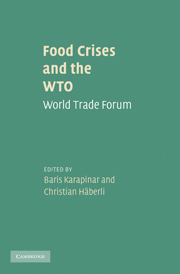Book contents
- Frontmatter
- Contents
- List of contributors
- List of figures
- List of tables
- List of abbreviations
- Preface
- 1 Introduction: food crises and the WTO
- PART 1 Economics of the food crisis
- PART 2 Trade and law: WTO and beyond
- 7 Agricultural policies: past, present and prospective under Doha
- 8 The food crisis and the role of the EC's Common Agricultural Policy
- 9 WTO disciplines and economic dimensions of the 2008 US Farm Bill
- 10 Impact of the food crisis on developing countries and implications for agricultural trade policy
- 11 Responses by the international trade and aid community to food security
- 12 Food security and WTO rules
- 13 Conclusions and policy recommendations
- Index
- References
9 - WTO disciplines and economic dimensions of the 2008 US Farm Bill
from PART 2 - Trade and law: WTO and beyond
Published online by Cambridge University Press: 12 May 2010
- Frontmatter
- Contents
- List of contributors
- List of figures
- List of tables
- List of abbreviations
- Preface
- 1 Introduction: food crises and the WTO
- PART 1 Economics of the food crisis
- PART 2 Trade and law: WTO and beyond
- 7 Agricultural policies: past, present and prospective under Doha
- 8 The food crisis and the role of the EC's Common Agricultural Policy
- 9 WTO disciplines and economic dimensions of the 2008 US Farm Bill
- 10 Impact of the food crisis on developing countries and implications for agricultural trade policy
- 11 Responses by the international trade and aid community to food security
- 12 Food security and WTO rules
- 13 Conclusions and policy recommendations
- Index
- References
Summary
Introduction
This chapter focuses on the political economy of the US Food, Conservation and Energy (FCE) Act of 2008 in light of current and potential WTO constraints on domestic support to agriculture. The uncertainty in global markets resulting from very sharp increases in the prices of oil and agricultural commodities in early 2008 and the dramatic global financial crisis and economic downturn later in the year set the stage for this evaluation of the new farm policy. As an exporter of its primary agricultural products, the US has maintained a relatively open market. Tariffs on agricultural imports are generally low (with a few exceptions, notably dairy products and sugar) and have been stable, with limited cuts to bound rates to meet WTO Uruguay Round commitments (Blandford, Laborde and Martin 2008). However, the policy story is more fluid in the domestic support arena where there have been substantial changes in policy instruments, particularly during the fourteen-year period since the Uruguay Round Agreement on Agriculture (URAA) came into effect. Annual acreage idling, a cornerstone of farm programmes since the 1950s, was abandoned in 1996 and was not resurrected during a subsequent period of low commodity prices. Deficiency payments that had been tied to prices and the production of specific crops were also replaced in 1996 by fixed direct payments largely decoupled from production decisions.
- Type
- Chapter
- Information
- Food Crises and the WTOWorld Trade Forum, pp. 220 - 241Publisher: Cambridge University PressPrint publication year: 2010
References
- 1
- Cited by



